 W
WJakob "Jaka" Avšič was the first commander of Chetnik units in Slovenia during the Second World War. At the end of October 1941, Colonel Avšič and Major Karl Novak went to Ravna Gora and met with Draža Mihailović, who appointed Avšič as his representative in Slovenia. Avšič soon deserted the Yugoslav Army in Fatherland and joined the communists. He was then instructed by the communist executive board to try to convince other Yugoslav army officers to desert and join the communists. During the war he used the pseudonym Branko Hrast.
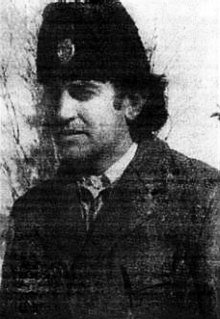 W
WPetar Baćović was a Bosnian Serb Yugoslav reserve army officer, lawyer, and then a Chetnik commander within occupied Yugoslavia during World War II. From the summer of 1941 until April 1942, he headed the cabinet of the Ministry of Internal Affairs for Milan Nedić's puppet Government of National Salvation in the German-occupied territory of Serbia. In May and June 1942, Baćović participated in the joint Italian-Chetnik offensive against the Yugoslav Partisans in Montenegro In July 1942, Baćović was appointed by the Chetnik leader Draža Mihailović and his Supreme Command as the commander of the Chetnik units in the regions of eastern Bosnia and Herzegovina within the Axis puppet state, the Independent State of Croatia. In this role, Baćović continued collaborating with the Italians against the Yugoslav Partisans, with his Chetniks formally recognised as Italian auxiliaries from mid-1942.
 W
WNiko Bartulović was an Austro-Hungarian and later Yugoslav writer, publisher, journalist and translator known for being one of the founders and ideologists of the Organization of Yugoslav Nationalists in 1921. He joined the Chetniks during World War II.
 W
WBranko "Brane" Bogunović was one of the commanders of Serb rebels during the Drvar uprising who later became military officer of the Yugoslav Army in the Fatherland.
 W
WJezdimir Dangić was a Yugoslav and Bosnian Serb Chetnik commander during World War II. He was born in the town of Bratunac in the Austro-Hungarian occupied Bosnia Vilayet of the Ottoman Empire. Imprisoned during World War I for his membership of the revolutionary movement Young Bosnia, he subsequently completed a law degree and became an officer in the gendarmerie of the Kingdom of Serbs, Croats and Slovenes at the beginning of 1928. In 1929, the country changed its name to the Kingdom of Yugoslavia. In 1940, Dangić was appointed to lead the court gendarmerie detachment stationed at the royal palace in the capital, Belgrade. During the Axis invasion of Yugoslavia in 1941, Dangić commanded the gendarmerie unit that escorted King Peter II to Montenegro as he fled the country. In August of that year, the leader of the Chetnik movement, Colonel Draža Mihailović, appointed Dangić as the commander of the Chetnik forces in eastern Bosnia. Here, Dangić and his men launched several attacks against the forces of the Independent State of Croatia. Soon after his appointment, Dangić's Chetniks captured the town of Srebrenica from the occupiers. Afterwards, they became largely inactive in fighting the Germans, choosing instead to avoid confrontation. In December, Chetniks under Dangić's command massacred hundreds of Bosnian Muslims in the town of Goražde. In the same month, his Chetniks captured five nuns and took them with them through Romanija to Goražde, where they later committed suicide to avoid being raped.
 W
WJovan Deroko was a Serbian military commander holding the rank of captain during World War II.
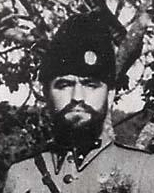 W
WMomčilo Đujić was a Serbian Orthodox priest and Chetnik warlord. He led a significant proportion of the Chetniks within the northern Dalmatia and western Bosnia regions of the Independent State of Croatia (NDH), a fascist puppet state created from parts of the occupied Kingdom of Yugoslavia during World War II. In this role he collaborated extensively with the Italian and then the German occupying forces against the communist-led Partisan insurgency.
 W
WSvetomir Đukić was the founder of the Olympic Committee of Serbia, an officer in the Serbian Army and a general in the Chetnik movement.
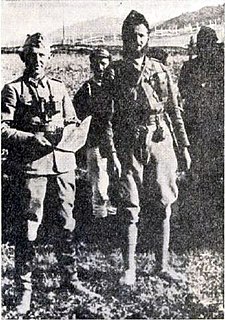 W
WUroš Drenović was a Bosnian Serb military commander in the central Bosnia region of the fascist, Ustaše-led puppet state known as the Independent State of Croatia (NDH) during World War II. After initially distinguishing himself in resisting the Ustaše alongside communist-led rebels, Drenović betrayed the communists and began to collaborate with the Ustaše, Italians and Germans.
 W
WPavle Đurišić was a Montenegrin Serb regular officer of the Royal Yugoslav Army who became a Chetnik commander (vojvoda) and led a significant proportion of the Chetniks in Montenegro during World War II. He distinguished himself and became one of the main commanders during the popular uprising against the Italians in Montenegro in July 1941, but later collaborated with the Italians in actions against the Communist-led Yugoslav Partisans. In 1943, his troops carried out several massacres against the Muslim population of Bosnia, Herzegovina and the Sandžak, and participated in the anti-Partisan Case White offensive alongside Italian forces. Đurišić was captured by the Germans in May 1943, escaped and was recaptured.
 W
WVučko Ignjatović was a Serbian officer of the Royal Yugoslav Army who was commander of the Požega Chetnik detachment during the Second World War in Yugoslavia.
 W
WDobroslav Jevđević was a Bosnian Serb politician and self-appointed Chetnik commander in the Herzegovina region of the Axis-occupied Kingdom of Yugoslavia during World War II. He was a member of the interwar Chetnik Association and the Organisation of Yugoslav Nationalists, a Yugoslav National Party member of the National Assembly, and a leader of the opposition to King Alexander between 1929 and 1934. The following year, he became the propaganda chief for the Yugoslav government.
 W
WMilan Kalabić was a Serbian military officer who fought in the Balkan Wars and the First World War and was involved with the Chetniks during the Second World War. He collaborated, from 1941 until 1942, with the collaborationist government of Milan Nedić as an officer in the Serbian State Guard and the county prefect of Kragujevac. He also aided the Chetniks, which would result in his execution by the Gestapo in October 1942. He was the father of Chetnik commander Nikola Kalabić.
 W
WNikola Kalabić was a Serbian Chetnik commander during World War II.
 W
WSimo Kecojević was a Serbian freedom fighter, having participated in the irregular guerrilla forces in the Kosovo Vilayet between 1910 and 1912, then as regular soldier in the Balkan Wars, World War I and World War II.
 W
WDragutin Keserović was a Yugoslav Chetnik military commander holding the rank of lieutenant colonel and vojvoda during World War II. Keserović was probably the most active commander of Mihailović's Chetniks in Serbia.
 W
WVojislav Lukačević was a Serbian Chetnik commander in the Kingdom of Yugoslavia during World War II. At the outbreak of war, he held the rank of captain of the reserves in the Royal Yugoslav Army.
 W
WJože Melaher - Zmagoslav was Yugoslav military officer, most notable for being commander of Chetnik Štajerska detachment during the World War II.
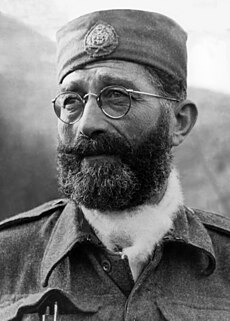 W
WDragoljub "Draža" Mihailović was a Yugoslav Serb general during World War II. He was the leader of the Chetnik Detachments of the Yugoslav Army (Chetniks), a royalist and nationalist movement and guerrilla force established following the German invasion of Yugoslavia in 1941.
 W
WAleksandar "Aca" Mišić was a Serbian military commander holding the rank of Major.
 W
WVeselin Misita was a Bosnian Serb military commander holding the rank of lieutenant colonel during World War II.
 W
WRuth Mitchell was a reporter who was the only American woman to serve with the Serbian Chetnik under Draža Mihailović in World War II. She was captured by the Gestapo and spent a year as a prisoner of war, later writing a book about her experiences. She also wrote a book about one of her brothers, General Billy Mitchell, who is regarded as the founder of the U.S. Air Force.
 W
WKarl Novak was a Yugoslav Slovene military officer best known as commander of the Slovene Chetniks in the Italian-annexed Province of Ljubljana during World War II.
 W
WKonstantin "Kosta" Milovanović Pećanac was a Serbian and Yugoslav Chetnik commander (vojvoda) during the Balkan Wars, World War I and World War II. Pećanac fought on the Serbian side in both Balkan Wars and World War I, joining the forces of Kosta Vojinović during the Toplica uprising of 1917. Between the wars he was an important leader of Chetnik veteran associations, and was known for his strong hostility to the Yugoslav Communist Party, which made him popular in conservative circles. As president of the Chetnik Association during the 1930s, he transformed it into an aggressively partisan Serb political organisation with over half a million members. During World War II, Pećanac collaborated with both the German military administration and their puppet government in the German-occupied territory of Serbia.
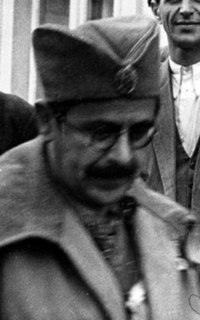 W
WIsmet Popovac was a Bosnian Muslim lawyer and physician who led a Muslim Chetnik militia known as the Muslim People's Military Organization (MNVO) in Bosnia and Herzegovina during World War II. He was active in pre-war Yugoslav politics, becoming a member of the Serbian Muslim cultural organization Gajret and serving as the mayor of Konjic, a town in northern Herzegovina. He is also said to have been candidate for Vladko Maček's electoral list, but was left without a job in the Yugoslav state government after the creation of the Banovina of Croatia in August 1939.
 W
WIvan Prezelj was a Yugoslav military officer and commander of Blue Guard, a detachment of Yugoslav Army in the Fatherland in German-occupied Slovenia during the World War II.
 W
WDragoslav Račić was a Serbian Chetnik military commander holding the rank of colonel and voivode during World War II.
 W
WRadoslav "Rade" Radić was a Bosnian Serb Chetnik commander (vojvoda) during World War II. At the start of World War II in Yugoslavia, he belonged to the Partisans, but in the spring of 1942 he staged a coup in which he killed members of his detachment headquarters and wounded Partisans, after which he formed his own Chetnik detachment, collaborating with the Nazi Germany and the Independent State of Croatia during the war. After the war, he was sentenced to death by the new communist authorities at the Belgrade Process and executed as a collaborator.
 W
WPredrag Raković was a Yugoslav military officer who joined the Chetnik forces of Draža Mihailović after the Axis invasion of Yugoslavia in April 1941 during World War II. He became commander of the Chetnik 2nd Ravna Gora Corps and collaborated with the German-installed puppet government in the German-occupied territory of Serbia and later directly with the Germans against the rival communist-led Yugoslav Partisans. His forces briefly cooperated with Soviet forces against the Germans in October 1944, but faced with Soviet demands that they lay down their weapons or join the Partisans, they withdrew from occupied Serbia.
 W
WMane Rokvić was a Serbian guerrilla commander during the Second World War. Rokvić briefly commanded of the Yugoslav Partisan 4th detachment of the Sloboda Battalion during the 1941 Drvar uprising, a spontaneous resistance by the Serbian population to the genocidal activities of the Independent State of Croatia in Western Bosnia. Later and most notably, Rokvić left the communist cause to join the royalist Dinara Chetnik Division to command of the King Alexander I regiment.
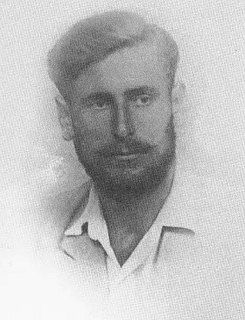 W
WDanilo "Dane" Stanisavljević was a Croatian Serb revolutionary who was one of the leaders of the uprising of Serbs in Lika against the Independent State of Croatia and later a military officer of the Chetnik units with the rank of voivode.
 W
WIlija Trifunović-Birčanin was a Serbian Chetnik military commander. He took part in the Balkan Wars and World War I and afterwards served as the president of the Association of Serb Chetniks for Freedom and the Fatherland in the Kingdom of Yugoslavia. Beginning in 1941 he collaborated with the Italians under the awareness and condonation of supreme Chetnik commander Draža Mihailović. In the spring of 1942, he was appointed by Mihailović as the commander of Chetniks in Dalmatia, Herzegovina, western Bosnia and southwestern Croatia. In October 1942, Trifunović-Birčanin and his subordinate commanders, Dobroslav Jevđević and Petar Baćović, were responsible for the killing of over 500 Bosnian Muslim and Bosnian Croat civilians in the Prozor region in October 1942. He died in Split on 3 February 1943, having suffered from poor health for a considerable period of time.
 W
WVladimir Vauhnik (1896—1955) was Yugoslav military officer of Slovenian extraction. Vauhnik is most notable for his Counterintelligence activities before and during World War II that could have changed the course of the war.
 W
WĐuro Vilović was a Yugoslav publicist, one of the most widely read and controversial writers of Croatian interwar literature and a member of the Chetniks.